Veg News
Promotional campaign will target UK suppliers and consumers after quinoa imports rose by 50% over one year
The Peru Trade & Investment Office has launched its first campaign to promote Peruvian quinoa in the UK market as imports reach an all time high.

Imports of Peruvian quinoa into the UK rose by 50% between 2013 and 2014, totaling $13 million (£8.5m) last year.
The new campaign will target consumers and industry with information about the varieties of quinoa, particularly red and black, as well as emphasising how quinoa production supports indigenous communities in the Peruvian Andes.
It will also focus on the health attributes of quinoa such as its high protein content and antioxidant levels through engaging with consumer and trade media, bloggers, recipe development and social media, alongside reaching out to UK quinoa suppliers and Peruvian restaurants.
“Quinoa is one of Peru’s most promising exports to the UK market, and the Trade & Investment Office will be supporting it with a promotional push for the first time this year,” said Jaime Cardenas, director of the Peru Trade and Investment Office.
“We have seen an international boom in this protein-rich food, as interest in healthier eating has increased in markets around the world. Here in Britain, this has been accompanied by significant growth in Peruvian cuisine.”
Peru is the world’s largest exporter of quinoa, exporting a total of 36,265 tonnes in 2014, accounting for 45% of world exports, followed by Bolivia with 29,505 tonnes (35%).
Quinoa is indigenous to the Andes region of South America.
Nationwide Produce and Three Musketeers are donating 50p from every box of mint potatoes to support the Poppy Appeal
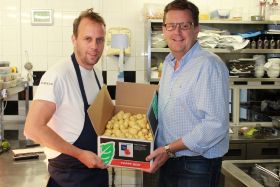
Nationwide Produce and Suffolk potato grower Three Musketeers will donate 50p to The Royal British Legion from every box of mint salad potatoes they sell during the three-week appeal.
After Edward Blanchard from Three Musketeers, and Nationwide’s Tim O’Malley, were moved by visiting Ypres, they decided to replace the mint leaf on packaging with a poppy in aid of the charity.
Backed by Michelin-starred chef Mark Poynton, the ‘Poppy Boxes’ went on sale on Wednesday 21 October at wholesalers and foodservice firms. O’Malley said: “This is a unique opportunity for buyers to support the Poppy Appeal while also backing British farming.
“We’re only five days into this promotion and the uplift in sales would already indicate that the amount we will raise for the Poppy Appeal will be closer to £15,000 than our original estimate of £10,000. The general reaction to this promotion from our customers has been very positive.”
Blanchard said it is “a great honour to help remember those that shouldn’t be forgotten” and asked the produce industry to support the initiative. “Chefs and buyers throughout the country, you can help us to raise some much-needed funds. Simply buy a product you already enjoy or swap from your usual supply and order a ‘Poppy Box’ of our Mint salad potatoes for the first time,” he said.
Sierra Exportadora urges more producers to get involved in lucrative export industry
Peruvian blueberry exports are expected to grow to US$70m in 2015 according to government agency Sierra Exportadora. Chief executive Alfonso Velasquez Tuesta said Peru would close the year with a planted area of 2,800ha.
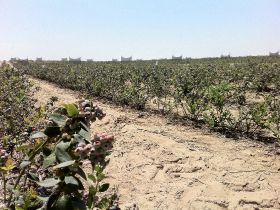
“From zero exports in 2009 to US$30m in 2014, Peru has climbed up the world rankings and is now the tenth biggest exporter of blueberries,” Velasquez said.
The projection is based on the continued strong growth in planted area, an increase in average yields from 8 tonnes to 10 tonnes and the growing number of young plants reaching maturity.
Velasquez noted that if more small producers joined forces to create farms of 25-30ha this would result in a big jump in the country’s blueberry export volume.
The US is the biggest market for fresh blueberries, importing around US$600m last year. This was followed by the UK with US$197m, then Canada and the Netherlands in third and fourth place.
“Peru should be aiming to fill the September-October window between the North American production, season which begins to wind down in August, and the start of the Chilean season in November,” Velasquez said.
On average, Peru produces 10-15 tonnes of blueberries per hectare. Velasquez claimed that since each hectare of production required an investment of US$40,000-US$45,000 and a yield of just 5 tonnes sold at US$10 per kg would generate an income of US$50,000, growers would already cover their start-up costs in one year.
More growth for discount retailers, but Sainsbury’s was the only ‘big four’ retailer to post sales growth over the last month, Kantar data shows
Lidl has achieved a new record share of the UK grocery market.
This is the second successive month Lidl has reached a new share high, and now claims 4.3% of the market, after seeing its growth accelerating to 17.9% in the 3 months to 11 October 2015.
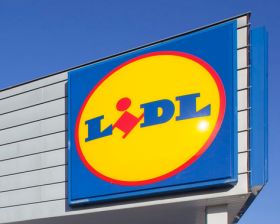
The discount retailer’s growth was particularly strong in Scotland, the scene of its ‘smarter shopping’ card trial.
The latest Kantar Worldpanel data also shows that Aldi saw its revenues rocket by 17.6% compared to last year’s figures.
Sainsbury’s was the only one of the larger supermarkets to see sales growth this period, and a strong performance in its online and c-store channels helped it to increase revenues by 1.1%.
However, Sainsbury’s market share was static at 16.1%.
Sales fell at Tesco by 1.7%, though it is too early to see the impact of its revamped ‘Brand Guarantee’ initiative. At Asda, sales fell by three per cent, bringing its market share down by 0.7 percentage points to 16.6%.
Meanwhile, sales at Morrisons fell by one per cent, taking its grocery market share to 10.8%
Fraser McKevitt, of Kantar Worldpanel, said: “In contrast to the overall market, online grocery sales have increased by 9.8% on last year. Despite this rapid expansion, space for retailers to increase both share and revenue in this area remains, with less than a fifth of households currently shopping online.
“Internet sales offer a chance of long term growth – only 18% of households bought groceries online in the last 12 weeks meaning there’s plenty of space for further expansion. The convenience factor and minimum spend restrictions mean online baskets tend to be larger, averaging £67 in value, compared with £14 for the average bricks and mortar trip.
“Amazon Fresh’s expected full launch early next year could be a major disruptor, bringing down average basket sizes, accommodating on demand shopping, and accelerating the growth of the whole online market.”
There has been further success this period for Waitrose, with sales up by 2.1%; The Co-operative also saw sales grow by one per cent, and Iceland grew for the sixth month in a row, increasing sales by 3.2%, benefitting from a wider range of premium products.
A survey that questioned 115 consumers found Pink Lady was the favoured snack, beating crisps, chocolate and celery
Branded apple Pink Lady has beaten off competition from celery, carrots and milk chocolate to become the nation’s top snack, according to a new consumer survey.
Conducted by Pink Lady brand manager Coregeo, the survey asked 115 consumers to rate snacks for taste, satisfaction, emotion and sensory attributes by either choosing a number on a nine-point scale, or selecting from a list of words that best described their reaction. This was dubbed the ‘Scale of Snackisfaction’ and analysed for qualitative consumer feedback on the different snacking options.
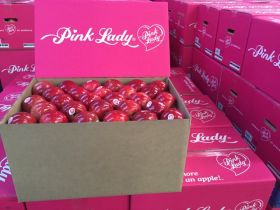
Pink Lady was rated top among consumers, followed by carrots and celery. Other snacks tested were milk chocolate, a shortbread finger, unsalted mixed nuts and crinkle cut ready salted crisps.
The survey forms part of the wider ‘Snackisfaction’ campaign, run by marketing agency MCG on behalf of Coregeo, which aims to position Pink Lady as the snack of choice. It was launched in April following a study from Leatherhead Food Research that demonstrated how subjective emotions such as guilt or excitement can influence the satisfaction rating of a sensory experience.
Other activity has included a ‘Tweet to eat’ roadshow and experiential marketing concept, where consumers could tweet the hashtag #snackisfaction to receive a Pink Lady by post.
During the campaign, 80,000 Pink Lady apples were distributed, coverage generated over 345,500 engagement opportunities on social media and Twitter activity rose by 11 per cent, Coregeo said.
Along with continuous investment in quality control and standards, this targeted consumer marketing has led to Pink Lady seeing a nine per cent year to date growth.
Michelle Toft, Coregeo chief marketing officer, said: “It’s no surprise to us that the Snackisfaction campaign was a huge hit with consumers because Pink Lady is fast becoming the fresh-fruit snacking favourite for the growing number of consumers who recognise its uniquely satisfying combination of taste, texture and refreshing nutritional qualities.
“In fact Pink Lady excelled in terms of tastiness and appearance and overall was more snackisfying than other types of snacks, showing that it’s a serious contender as a satisfying snack.”
A petition aiming for 100,000 signatures is calling for a greater blanket ban of neonics, while a bee species returns to Lincolnshire
Almost 90,000 people have signed a petition calling for the government to clamp down on the neonicotinoid ban following a ruling that allowed four counties to use limited amounts of the pesticide.
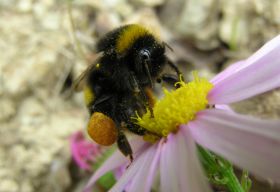
The petition, which wants a complete ban on neonics pesticides to be maintained and enforced by government, will be considered for parliamentary debate if it reaches 100,000 signatures by the closing date which is the end of January 2016.
Three neonics were banned for two years for use on flowering crops in December 2013, following concerns over harmful effects on pollinators.
Farming bodies and other agriculture stakeholders disputed the decision, and this year Defra allowed four counties to use neonicotinoid-treated rape seed following lobbying from the NFU.
The petition is named ‘Don’t kill our bees! Immediately halt the use of neonicotinoids on crops’ and argues that neonics should be banned because they are harmful to pollinators.
The news comes as the Andrena Nitida bee species was spotted in Lincolnshire, after not being seen in the area since 1900.
It was found on a new Syngenta Operation Pollinator habitat area, created by Beeswax Farming, which is owned by hoover tycoon Sir James Dyson.
Bee entomology specialist Mike Edwards described the find as “very encouraging”. “It is very encouraging that habitat creation on farmland is helping some of these solitary bee species to recover in numbers, and to extend their range across the UK,” he said.
“Andrena nitida is one of the many solitary mining bee species that play such an important part in pollinating crops and wildflowers. They look very much like honeybees. However, their behaviour on flowers, and the fact they carry large amounts of dry pollen as they fly from flower to flower, makes them extremely efficient pollinators.”
Former business’ operations director, David Bateman, steps up to the new role, while Robert Wells becomes CEO
David Bateman has been appointed as managing director at banana giant SH Pratt.

Bateman, who has been with the business for two years, was operations director prior to this appointment. He will lead the day-to-day running of the business, as well as a number of strategic initiatives currently being developed.
Robert Wells, majority shareholder of SH Pratt, will move to the role of CEO, in order to provide further strategic vision
and direction.
In addition, Simon Trewin, commercial director, has been appointed as a full board member of SH Pratt, in order to reinforce the development of the company’s commercial direction.
A spokesperson for SH Pratt said: “As the business grows and develops, we will create additional companies within the SH Pratt Group family; and implement a new brand identity, currently in discussion. This will be implemented in due course.
“Pratt’s Bananas logistics division has seen rapid and successful growth in recent times. To take this part of the business to
the next level, it has been set up as a separate company ‘Kinship Logistics’, under the umbrella of the SH Pratt parent company.
“Kinship, whose name represents the family nature of our business, has been given a brand new fresh and vibrant identity, to help reflect the diverse range of goods we carry. It will also help our vehicles to stand out and be easily recognised. The new identity is currently being rolled-out.”
Tony Hunter, previously head of SH Pratt’s logistics, has been appointed as director of logistics for the new Kinship Logistics company.
Forty workers at Quality Produce International participated in the cancer fundraising Ride for the Roses bicycle race in the Netherlands

Over €45,000 has been raised by employees of Dutch firm Quality Produce International (QPI) for charity.
Forty workers at the company participated in the cancer fundraising event Ride for the Roses bicycle in the Netherlands on 6 September.
This year’s edition was in and around Aalsmeer, and all forty employees completed the 100km race by bicycle without any problems.
Part of the overall total the business raised also came through selling fruit and vegetable boxes, an initiative developed together with local food-service supplier Flexivers.
The rest of the amount was donated by participants, friends and family, but most of all by customers and suppliers.
Marcel Paul, of QPI, said: “The whole team is very proud that we could donate such a fabulous amount at the finish. Hereby we woud like to thank all that helped us for raising this fantastic sum of money for cancer research in Holland, and we hope we can count on all of your support again next year.”
Produce World has produced and launched a new Chinese sweet sprouting cauliflower into select Waitrose stores
New sweet sprouting cauliflower has been launched into limited numbers of Waitrose stores through vegetable supplier Produce World.
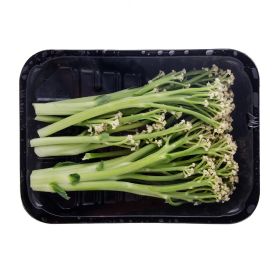
The brassica, which is native to China, can be eaten raw or cooked, and is sweeter than a traditional cauliflower. It has long stems and small, white heads, described as “less intimidating” to younger consumers.
“Sweet Sprouting Cauliflower has been popular in China for a long time and it has a number of characteristics which we believe will appeal to British consumers of all ages,” said Waitrose buyer Gemma Hodgson.
“We know that people are under time pressure, and preparation and cooking times are getting shorter. This product can be eaten raw in salads, used in stir-fries, steamed, roasted or barbequed and it’s ready in a matter of minutes. We also think that the sweet taste and crunchy texture will appeal to children and adults alike.”
Frank Robinson, Produce World sales and marketing director, said: “This is a healthy and very exciting innovation, and will be a new way to enjoy cauliflower for a younger generation. It is not as intimidating as traditional cauliflower in terms of size. It is available in manageable one meal portion sizes, targeting premium meal occasions.”
The news comes as Produce World launched purple carrots into Waitrose last week, in partnership with fellow vegetable supplier Huntapac.